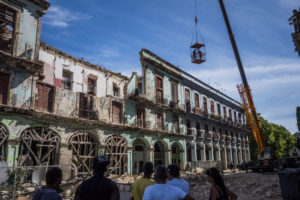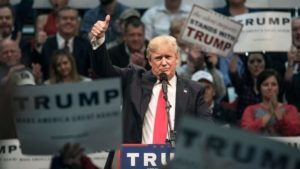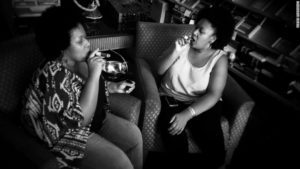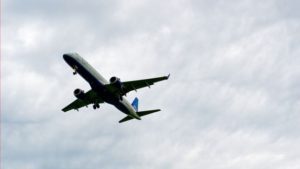Gerard Dion's Blog, page 15
August 1, 2016
Group Of Cuban Government Officials Criticized U.S. Policy Changes Allowing Cuban Coffee Imports As “The Intentions Of Imperialist Policy.”
Group Of Cuban Government Officials Criticized U.S. Policy Changes Allowing Cuban Coffee Imports As “The Intentions Of Imperialist Policy.” “Since the State Department announced this change in April, the National Bureau of Small Farmers Association (ANAP), a group of government officials who represent Cuba’s farmers, published a statement about the updated policy last month. ‘Next to the workers and our entire people, we are facing up to the intentions of imperialist policy, to bring about division and disintegration in Cuban society, which is what they would seek with the recently announced measure,’ ANAP wrote in their statement.” [InCubaToday, “Cuba making it difficult for farmers to export coffee to the U.S.,”
JetBlue’s Cuba Flights Launch August 31, Starting at Just $99
JetBlue’s Cuba Flights Launch August 31, Starting at Just $99 | MONEYd;d++)c[d].apply(u,n);return u}function a(t,e){f[t]=s(t).concat(e)}function s(t){return f[t]||[]}function c(){return n(e)}var f={};return{on:a,emit:e,create:c,listeners:s,_events:f}}function r(){return{}}var o="nr@context",i=t("gos");e.exports=n()},{gos:"7eSDFh"}],ee:[function(t,e){e.exports=t("QJf3ax")},{}],3:[function(t){function e(t){try{i.console&&console.log(t)}catch(e){}}var n,r=t("ee"),o=t(1),i={};try{n=localStorage.getItem("__nr_flags").split(","),console&&"function"==typeof console.log&&(i.console=!0,-1!==n.indexOf("dev")&&(i.dev=!0),-1!==n.indexOf("nr_dev")&&(i.nrDev=!0))}catch(a){}i.nrDev&&r.on("internal-error",function(t){e(t.stack)}),i.dev&&r.on("fn-err",function(t,n,r){e(r.stack)}),i.dev&&(e("NR AGENT IN DEVELOPMENT MODE"),e("flags: "+o(i,function(t){return t}).join(", ")))},{1:22,ee:"QJf3ax"}],4:[function(t){function e(t,e,n,i,s){try{c?c-=1:r("err",[s||new UncaughtException(t,e,n)])}catch(f){try{r("ierr",[f,(new Date).getTime(),!0])}catch(u){}}return"function"==typeof a?a.apply(this,o(arguments)):!1}function UncaughtException(t,e,n){this.message=t||"Uncaught error with no additional information",this.sourceURL=e,this.line=n}function n(t){r("err",[t,(new Date).getTime()])}var r=t("handle"),o=t(6),i=t("ee"),a=window.onerror,s=!1,c=0;t("loader").features.err=!0,t(5),window.onerror=e;try{throw new Error}catch(f){"stack"in f&&(t(1),t(2),"addEventListener"in window&&t(3),window.XMLHttpRequest&&XMLHttpRequest.prototype&&XMLHttpRequest.prototype.addEventListener&&window.XMLHttpRequest&&XMLHttpRequest.prototype&&XMLHttpRequest.prototype.addEventListener&&!/CriOS/.test(navigator.userAgent)&&t(4),s=!0)}i.on("fn-start",function(){s&&(c+=1)}),i.on("fn-err",function(t,e,r){s&&(this.thrown=!0,n(r))}),i.on("fn-end",function(){s&&!this.thrown&&c>0&&(c-=1)}),i.on("internal-error",function(t){r("ierr",[t,(new Date).getTime(),!0])})},{1:9,2:8,3:6,4:10,5:3,6:23,ee:"QJf3ax",handle:"D5DuLP",loader:"G9z0Bl"}],5:[function(t){function e(){}if(window.performance&&window.performance.timing&&window.performance.getEntriesByType){var n=t("ee"),r=t("handle"),o=t(1),i=t(2);t("loader").features.stn=!0,t(3),n.on("fn-start",function(t){var e=t[0];e instanceof Event&&(this.bstStart=Date.now())}),n.on("fn-end",function(t,e){var n=t[0];n instanceof Event&&r("bst",[n,e,this.bstStart,Date.now()])}),o.on("fn-start",function(t,e,n){this.bstStart=Date.now(),this.bstType=n}),o.on("fn-end",function(t,e){r("bstTimer",[e,this.bstStart,Date.now(),this.bstType])}),i.on("fn-start",function(){this.bstStart=Date.now()}),i.on("fn-end",function(t,e){r("bstTimer",[e,this.bstStart,Date.now(),"requestAnimationFrame"])}),n.on("pushState-start",function(){this.time=Date.now(),this.startPath=location.pathname+location.hash}),n.on("pushState-end",function(){r("bstHist",[location.pathname+location.hash,this.startPath,this.time])}),"addEventListener"in window.performance&&(window.performance.addEventListener("webkitresourcetimingbufferfull",function(){r("bstResource",[window.performance.getEntriesByType("resource")]),window.performance.webkitClearResourceTimings()},!1),window.performance.addEventListener("resourcetimingbufferfull",function(){r("bstResource",[window.performance.getEntriesByType("resource")]),window.performance.clearResourceTimings()},!1)),document.addEventListener("scroll",e,!1),document.addEventListener("keypress",e,!1),document.addEventListener("click",e,!1)}},{1:9,2:8,3:7,ee:"QJf3ax",handle:"D5DuLP",loader:"G9z0Bl"}],6:[function(t,e){function n(t){i.inPlace(t,["addEventListener","removeEventListener"],"-",r)}function r(t){return t[1]}var o=t("ee").create(),i=t(1)(o),a=t("gos");if(e.exports=o,n(window),"getPrototypeOf"in Object){for(var s=document;s&&!s.hasOwnProperty("addEventListener");)s=Object.getPrototypeOf(s);s&&n(s);for(var c=XMLHttpRequest.prototype;c&&!c.hasOwnProperty("addEventListener");)c=Object.getPrototypeOf(c);c&&n(c)}else XMLHttpRequest.prototype.hasOwnProperty("addEventListener")&&n(XMLHttpRequest.prototype);o.on("addEventListener-start",function(t){if(t[1]){var e=t[1];"function"==typeof e?this.wrapped=t[1]=a(e,"nr@wrapped",function(){return i(e,"fn-",null,e.name||"anonymous")}):"function"==typeof e.handleEvent&&i.inPlace(e,["handleEvent"],"fn-")}}),o.on("removeEventListener-start",function(t){var e=this.wrapped;e&&(t[1]=e)})},{1:24,ee:"QJf3ax",gos:"7eSDFh"}],7:[function(t,e){var n=t("ee").create(),r=t(1)(n);e.exports=n,r.inPlace(window.history,["pushState"],"-")},{1:24,ee:"QJf3ax"}],8:[function(t,e){var n=t("ee").create(),r=t(1)(n);e.exports=n,r.inPlace(window,["requestAnimationFrame","mozRequestAnimationFrame","webkitRequestAnimationFrame","msRequestAnimationFrame"],"raf-"),n.on("raf-start",function(t){t[0]=r(t[0],"fn-")})},{1:24,ee:"QJf3ax"}],9:[function(t,e){function n(t,e,n){t[0]=o(t[0],"fn-",null,n)}var r=t("ee").create(),o=t(1)(r);e.exports=r,o.inPlace(window,["setTimeout","setInterval","setImmediate"],"setTimer-"),r.on("setTimer-start",n)},{1:24,ee:"QJf3ax"}],10:[function(t,e){function n(){f.inPlace(this,p,"fn-")}function r(t,e){f.inPlace(e,["onreadystatechange"],"fn-")}function o(t,e){return e}function i(t,e){for(var n in t)e[n]=t[n];return e}var a=t("ee").create(),s=t(1),c=t(2),f=c(a),u=c(s),d=window.XMLHttpRequest,p=["onload","onerror","onabort","onloadstart","onloadend","onprogress","ontimeout"];e.exports=a,window.XMLHttpRequest=function(t){var e=new d(t);try{a.emit("new-xhr",[],e),u.inPlace(e,["addEventListener","removeEventListener"],"-",o),e.addEventListener("readystatechange",n,!1)}catch(r){try{a.emit("internal-error",[r])}catch(i){}}return e},i(d,XMLHttpRequest),XMLHttpRequest.prototype=d.prototype,f.inPlace(XMLHttpRequest.prototype,["open","send"],"-xhr-",o),a.on("send-xhr-start",r),a.on("open-xhr-start",r)},{1:6,2:24,ee:"QJf3ax"}],11:[function(t){function e(t){var e=this.params,r=this.metrics;if(!this.ended){this.ended=!0;for(var i=0;c>i;i++)t.removeEventListener(s[i],this.listener,!1);if(!e.aborted){if(r.duration=(new Date).getTime()-this.startTime,4===t.readyState){e.status=t.status;var a=t.responseType,f="arraybuffer"===a||"blob"===a||"json"===a?t.response:t.responseText,u=n(f);if(u&&(r.rxSize=u),this.sameOrigin){var d=t.getResponseHeader("X-NewRelic-App-Data");d&&(e.cat=d.split(", ").pop())}}else e.status=0;r.cbTime=this.cbTime,o("xhr",[e,r,this.startTime])}}}function n(t){if("string"==typeof t&&t.length)return t.length;if("object"!=typeof t)return void 0;if("undefined"!=typeof ArrayBuffer&&t instanceof ArrayBuffer&&t.byteLength)return t.byteLength;if("undefined"!=typeof Blob&&t instanceof Blob&&t.size)return t.size;if("undefined"!=typeof FormData&&t instanceof FormData)return void 0;try{return JSON.stringify(t).length}catch(e){return void 0}}function r(t,e){var n=i(e),r=t.params;r.host=n.hostname+":"+n.port,r.pathname=n.pathname,t.sameOrigin=n.sameOrigin}if(window.XMLHttpRequest&&XMLHttpRequest.prototype&&XMLHttpRequest.prototype.addEventListener&&!/CriOS/.test(navigator.userAgent)){t("loader").features.xhr=!0;var o=t("handle"),i=t(2),a=t("ee"),s=["load","error","abort","timeout"],c=s.length,f=t(1);t(4),t(3),a.on("new-xhr",function(){this.totalCbs=0,this.called=0,this.cbTime=0,this.end=e,this.ended=!1,this.xhrGuids={}}),a.on("open-xhr-start",function(t){this.params={method:t[0]},r(this,t[1]),this.metrics={}}),a.on("open-xhr-end",function(t,e){"loader_config"in NREUM&&"xpid"in NREUM.loader_config&&this.sameOrigin&&e.setRequestHeader("X-NewRelic-ID",NREUM.loader_config.xpid)}),a.on("send-xhr-start",function(t,e){var r=this.metrics,o=t[0],i=this;if(r&&o){var f=n(o);f&&(r.txSize=f)}this.startTime=(new Date).getTime(),this.listener=function(t){try{"abort"===t.type&&(i.params.aborted=!0),("load"!==t.type||i.called===i.totalCbs&&(i.onloadCalled||"function"!=typeof e.onload))&&i.end(e)}catch(n){try{a.emit("internal-error",[n])}catch(r){}}};for(var u=0;c>u;u++)e.addEventListener(s[u],this.listener,!1)}),a.on("xhr-cb-time",function(t,e,n){this.cbTime+=t,e?this.onloadCalled=!0:this.called+=1,this.called!==this.totalCbs||!this.onloadCalled&&"function"==typeof n.onload||this.end(n)}),a.on("xhr-load-added",function(t,e){var n=""+f(t)+!!e;this.xhrGuids&&!this.xhrGuids[n]&&(this.xhrGuids[n]=!0,this.totalCbs+=1)}),a.on("xhr-load-removed",function(t,e){var n=""+f(t)+!!e;this.xhrGuids&&this.xhrGuids[n]&&(delete this.xhrGuids[n],this.totalCbs-=1)}),a.on("addEventListener-end",function(t,e){e instanceof XMLHttpRequest&&"load"===t[0]&&a.emit("xhr-load-added",[t[1],t[2]],e)}),a.on("removeEventListener-end",function(t,e){e instanceof XMLHttpRequest&&"load"===t[0]&&a.emit("xhr-load-removed",[t[1],t[2]],e)}),a.on("fn-start",function(t,e,n){e instanceof XMLHttpRequest&&("onload"===n&&(this.onload=!0),("load"===(t[0]&&t[0].type)||this.onload)&&(this.xhrCbStart=(new Date).getTime()))}),a.on("fn-end",function(t,e){this.xhrCbStart&&a.emit("xhr-cb-time",[(new Date).getTime()-this.xhrCbStart,this.onload,e],e)})}},{1:"XL7HBI",2:12,3:10,4:6,ee:"QJf3ax",handle:"D5DuLP",loader:"G9z0Bl"}],12:[function(t,e){e.exports=function(t){var e=document.createElement("a"),n=window.location,r={};e.href=t,r.port=e.port;var o=e.href.split("://");return!r.port&&o[1]&&(r.port=o[1].split("/")[0].split("@").pop().split(":")[1]),r.port&&"0"!==r.port||(r.port="https"===o[0]?"443":"80"),r.hostname=e.hostname||n.hostname,r.pathname=e.pathname,r.protocol=o[0],"/"!==r.pathname.charAt(0)&&(r.pathname="/"+r.pathname),r.sameOrigin=!e.hostname||e.hostname===document.domain&&e.port===n.port&&e.protocol===n.protocol,r}},{}],13:[function(t,e){function n(t){return function(){r(t,[(new Date).getTime()].concat(i(arguments)))}}var r=t("handle"),o=t(1),i=t(2);"undefined"==typeof window.newrelic&&(newrelic=window.NREUM);var a=["setPageViewName","addPageAction","setCustomAttribute","finished","addToTrace","inlineHit","noticeError"];o(a,function(t,e){window.NREUM[e]=n("api-"+e)}),e.exports=window.NREUM},{1:22,2:23,handle:"D5DuLP"}],gos:[function(t,e){e.exports=t("7eSDFh")},{}],"7eSDFh":[function(t,e){function n(t,e,n){if(r.call(t,e))return t[e];var o=n();if(Object.defineProperty&&Object.keys)try{return Object.defineProperty(t,e,{value:o,writable:!0,enumerable:!1}),o}catch(i){}return t[e]=o,o}var r=Object.prototype.hasOwnProperty;e.exports=n},{}],D5DuLP:[function(t,e){function n(t,e,n){return r.listeners(t).length?r.emit(t,e,n):void(r.q&&(r.q[t]||(r.q[t]=[]),r.q[t].push(e)))}var r=t("ee").create();e.exports=n,n.ee=r,r.q={}},{ee:"QJf3ax"}],handle:[function(t,e){e.exports=t("D5DuLP")},{}],XL7HBI:[function(t,e){function n(t){var e=typeof t;return!t||"object"!==e&&"function"!==e?-1:t===window?0:i(t,o,function(){return r++})}var r=1,o="nr@id",i=t("gos");e.exports=n},{gos:"7eSDFh"}],id:[function(t,e){e.exports=t("XL7HBI")},{}],G9z0Bl:[function(t,e){function n(){var t=p.info=NREUM.info,e=f.getElementsByTagName("script")[0];if(t&&t.licenseKey&&t.applicationID&&e){s(d,function(e,n){e in t||(t[e]=n)});var n="https"===u.split(":")[0]||t.sslForHttp;p.proto=n?"https://":"http://",a(... r=f.createElement("script");r.src=p.proto+t.agent,e.parentNode.insertBefore(r,e)}}function r(){"complete"===f.readyState&&o()}function o(){a("mark",["domContent",i()])}function i(){return(new Date).getTime()}var a=t("handle"),s=t(1),c=window,f=c.document;t(2);var u=(""+location).split("?")[0],d={beacon:"bam.nr-data.net",errorBeacon:"bam.nr-data.net",agent:"js-agent.newrelic.com/nr-686.min.js"... n(t,e){var n=[],o="",i=0;for(o in t)r.call(t,o)&&(n[i]=e(o,t[o]),i+=1);return n}var r=Object.prototype.hasOwnProperty;e.exports=n},{}],23:[function(t,e){function n(t,e,n){e||(e=0),"undefined"==typeof n&&(n=t?t.length:0);for(var r=-1,o=n-e||0,i=Array(0>o?0:o);++r
This week JetBlue announced that it will begin regularly scheduled commercial flights to Cuba on Wednesday, August 31, with fares starting at just $99 each way.
The total cost of a round trip could be as low as $204, with all mandatory taxes and fees included. Availability at such a cheap fare is limited, but we did a search of the route this morning and indeed were able to find a flight departing on August 31 and returning one week later for a grand total of $204. It’s “the lowest Cuba fare announced so far by a commercial airline,” the Miami Herald reported.
JetBlue’s first route to Cuba will connect Fort Lauderdale-Hollywood airport (about an hour north of Miami) to Santa Clara–Abel Santamaría airport (about three hours east of Havana). The airline will fly this route every Monday, Wednesday, and Friday as of August 31, and will launch daily service on October 1. Two other routes are planned for launch with daily service in November, to Camagüey – Ignacio Agramonte Airport and Holguín – Frank País Airport, both from Fort Lauderdale.
Trump: I’d open a hotel in Cuba
Dion Publishing proudly presents Article submitted by THE HILL PRESS By Jesse Byrnes
<img height=”1″ width=”1″ style=”display:none” src=”https://www.facebook.com/tr?id=157579...″ />
Trump: I’d open a hotel in Cuba
Getty Images
Republican presidential candidate Donald Trump on Monday evening expressed openness to expanding his self-branded line of hotels into Cuba.
“I would, I would,” the real estate developer said during an interview on CNN’s “Situation Room,” adding, “at the right time, when we’re allowed to do it. Right now, we’re not.”
“I would do it on the basis that you get a 49 percent interest, because right now you get a 49 percent interest,” Trump added. “Nobody even knows what the economics are or what they’re going to do.”
<img height=”1″ width=”1″ style=”display:none” src=”https://www.facebook.com/tr?id=157579...″ />
Trump has largely expressed agreement with the Obama administration’s moves to reestablish diplomatic relations with the isolated nation, where Obama is visiting during a historic trip.
Obama and Cuban President Raul Castro spoke during a joint press conference in Havana earlier in the day Monday, as U.S. officials seek to push for a continued focus on human rights in Cuba amid normalized diplomatic relations.
<img height=”1″ width=”1″ style=”display:none” src=”https://www.facebook.com/tr?id=157579...″ />
“Maybe it won’t work out, but I will tell you, I think Cuba has a certain potential and I think it’s OK to bring Cuba into the fold,” Trump said on CNN, adding, “but you have to make a much better deal.”
He then alluded to his argument that arose during a GOP debate earlier this month when he was mocked after claiming that the Cuban government wanted “reparations for years of abuse by the United States.”
“You don’t want to be sued in a year from now or two years from now for $4 trillion because they said we destroyed Cuba,” Trump said on CNN. “It has to be part of the deal.”
Tags: Cuba, Donald Trump, Cuba-United States relations
July 24, 2016
These twin sisters are taking on the male-dominated cigar world
These twin sisters are taking on the male-dominated cigar world by Parija Kavilanz @CNNMoney
Yvonne and Yvette Rodrigquez, founders of Tres Lindas Cubanas.
“She’s the reason we’re passionate about cigars,” said Yvette, 37. “We adored this typical Cuban woman who’d wear headscarves, flowing skirts and smoke cigars. She wasn’t embarrassed. She enjoyed them.”
Even though their parents didn’t smoke cigars, both sisters took their first puffs as teenagers.
“We were 16,” said Yvette. “It was almost a seamless rite of passage growing up in the Cuban community in Miami, like taking your first sip of rum.”
Two years ago, Yvette and Yvonne took a leap of faith. They gave up their jobs in public relations and media, respectively, and launched cigar brand called Tres Lindas Cubanas.
“The name is from a folk song about three beautiful Cuban ladies,” said Yvonne. “We say it’s us and our grandmother.”
The sisters researched the industry and weren’t surprised by what they learned: “It’s very male-dominated,” said Yvonne, “You won’t easily find women-owned cigar brands.”
In the U.S. — the biggest market for cigars, followed by China, the Netherlands, Spain and France — more than 6 billion cigars were sold in 2015, valued at more than $6.6. billion, according to market research firm Euromonitor.
The challenge to break into the industry didn’t faze the sisters. “We’ve always been outside of the box because we don’t like to conform to what’s expected,” said Yvette.
With $10,000 of their own money, and no generational ties to the cigar business (as is common in the industry), the twins recruited their boyfriends to join the startup. After a year of research and development, the team debuted the cigar brand online and in cigar stores across Miami.
“Everyone told us not to sell in Miami first because it’s so competitive here. But we wanted to prove ourselves and our product,” said Yvonne.
Today, the business is profitable and generating more than $50,000 in annual revenue.
The cigars — priced between $8 to $10 each — are now sold in stores in six states, including Illinois, Florida, Maryland, Texas, North Carolina and Washington. “We recently sent a small order of 10 boxes to a store in Maryland and they sold out the next day. That felt great,” she said.
“We are the new demographic of cigar smokers,” she said. “We are contemporary, urban and sophisticated yet traditional at the same time. We want to position Tres Lindas Cubanas in this niche.”
Another milestone: “I think we could be the only cigar brand owned and run by Afro-Cuban American women,” said Yvette.
“Yvonne and I generally knew we wanted to pursue this but hadn’t really given it a lot of thought,” said Yvette. While on vacation there, Yvette had a serendipitous meeting with an owner of a cigar factory in Nicaragua.
“We kept in touch and eventually got into business with him,” she said. Over a year, the sisters worked with the business partner to create three unique blends — light, mild and strong.
“The blends reflect the brand’s name,”Yvette added. “We wanted the flavors to celebrate our Afro-Cuban heritage and the many complexions of women in our community.
They named the blends “La Clarita” (mild blend rolled in lighter leaf), “La Mulata” (medium-to-strong in a brown leaf) and “La Negrita” (full-bodied rolled in a dark leaf).
With a limited budgets, they adopted grassroots marketing. “We’d walk into cigar stores pitching the brand. We tapped social media and did a lot of word-of-mouth advertising,” said Yvette.
But it wasn’t easy.
“We’d get hazed,” said Yvonne. “Businesses didn’t take us seriously at first. They’d interrogate us like it was a job interview. It didn’t offend us because we were prepared.”
Related: Women cash in on the marijuana boom
Yvette and Yvonne want to steadily grow the business. “We have no debt and we want to keep it that way,” said Yvette.
As relations improve between the United States and Cuba, the duo wants to one day have a presence there.
“Our parents fled Cuba to come to the United States. We’re American but we’re also very connected with Cuba,” said Yvette
Her ultimate vision: “We’d love to have a tobacco farm in Cuba and make Cuban cigars,” she said.
CNNMoney (New York) First published July 22, 2016: 8:08 AM ET
July 23, 2016
GOP warming up to Cuba travel
GOP warming up to Cuba travel
By Tim Devaney – 07/17/16 08:14 PM EDT
Republican opposition to lifting the Cuban travel embargo is beginning to erode on Capitol Hill.
As President Obama looks to restore diplomatic relations with the country, a small but growing number of Republicans are getting behind a measure from Sens. Jeff Flake’s (Ariz.) and Jerry Moran (Kan.) that would lift the restrictions on American tourism in Cuba.
The bipartisan Freedom to Travel to Cuba Act from Flake has 51 co-sponsors so far, and gained an additional 14 Republican supporters this year alone in the House and Senate.
Bolstering Flake’s effort, presumptive Republican nominee has Donald Trump has also expressed support for opening up Cuba, saying that he is “fine” with Obama’s attempt to normalize relations.
But there is still strong opposition among congressional Republicans to lifting the travel ban. Prominent lawmakers such as Sens. Ted Cruz (R-Texas) and Marco Rubio (R-Fla.) remain staunchly opposed, arguing it would enrich the Castro government despite its history of human rights abuses.
“We all want more democracy in Cuba,” Flake told The Hill. “They see it a little differently than I do, but they know this is the direction it’s going.”
The Obama administration has loosened some of the Cuba travel restrictions to allow politicians, journalists, students, and Cuban-Americans who are meeting family to visit to the communist island. But only Congress can lift the restrictions entirely.
The same is true of the Cuban trade embargo, which prevents the majority of American businesses from operating on the island.
It’s an issue that has divided lawmakers on both sides of the aisle for more than five decades.
“I’ve had this argument with [Flake] for years,” said Rep. Chris Smith (R-N.J.). “Our currency is keeping this dictatorship afloat. The Cuban travel industry is largely run by the Castro regime, so our money is flowing into their coffers and keeping the dictatorship afloat.”
But critics of the embargo say keeping it only place only worsens the human rights abuses that critics invoke.
“The more tourists you have with cameras, at some point it begins to put pressure on the Cuban government to treat their people more appropriately,” Sen. Bill Cassidy (R-La.) told The Hill.
“Are the security forces more or less likely to beat up a lady in white if there are a bunch of tourists holding video cameras?”
Cassidy signed on as a co-sponsor of Flake’s bill last month.
Flake told The Hill momentum is building among Republicans who want to lift the Cuba travel restrictions.
“Believe me, we’ve got more than 60 votes,” Flake told The Hill, adding that he’s spoken with Sen. Mike Crapo (R-Idaho) and Sen. Bill Nelson (D-Fla.), and believes they will sign onto the measure in the near future.
A House measure similar to Flake’s led by Rep. Mark Sanford (R-S.C.) has 130 co-sponsors, including nearly two-dozen Republicans.
But there are staunch opponents of lifting the travel ban in the House Republican Conference.
Among them is Rep. Ileana Ros-Lehtinen (R-Fla.), one of the most vocal critics of President Obama’s efforts to normalize relations with Cuba.
“Cuban people are no more free today than they were before Obama’s terrible deal” Ros-Lehtinen said in 2014.
“Lifting the tourism ban would infuse the Castro dictatorship with billions of dollars, which it would use to more aggressively oppose U.S. interests in our hemisphere and to further repress the Cuban people,” Rep. Carlos Curbelo (R-Fla.) told McClatchy when the bill was introduced.
TAGS:Donald Trump, Bill Nelson, Jerry Moran, Marco Rubio, Jeff Flake, Mike Crapo, Ted Cruz
The U.S. Influence On Cuba’s Rapid Cultural Change
Heard on Weekend Edition Saturday
LATIN AMERICA
As big-name celebrities flock to the territory, Cuban culture is undergoing rapid change. But do Cubans want Chanel stores and Rolling Stones concerts?
SCOTT SIMON, HOST:
Cuba is happening – The Rolling Stones, the Obamas, the Kardashians. American cruise ships have all gone there this year, a lot for a country that hasn’t seen those kinds of visitors for a very long time. NPR’s Mandalit del Barco tells us that some Cubans are both welcoming and a little worried about what might come next.
MANDALIT DEL BARCO, BYLINE: Here in downtown Havana, the walls of the old buildings are filled with faded images of Che Guevara and slogans of the 1959 Revolution. But you don’t see any billboards or commercial ads. Artist Nelson Ramirez Arellano Conde imagines an alternate reality.
NELSON RAMIREZ ARELLANO CONDE: This is a series entitled “Hotel Havana.”
DEL BARCO: Ramirez is the director of the photography institute, Fototeca de Cuba. He has an exhibition of his work on the gallery walls of la Fabrica de Arte Cubano. Ramirez has taken archival images of Havana from the 1940s and ’50s. On the old buildings, he’s photoshopped advertisements – Coca-Cola, Google, Chevrolet and McDonald’s, companies, he says, might be in Cuba’s future.
RAMIREZ: This future is represented by billboards and advertisements that for many people are a sign of progress and for other people are a sign of visual pollution.
DEL BARCO: Ramirez says some Cubans may fear change. Others may be excited about, but that evolution is what the revolution was all about.
RAMIREZ: The revolution is supposed to be Marxist. According to that theory, things have to change to stay alive, you know.
DEL BARCO: During my visit, I asked other Cubans what they hoped and feared as more Americans and American companies began coming here.
ALEJANDRO SANCHEZ COBAS: For my generation, we love the American culture. We are not hungry for dollars. We are hungry for friends. We are hungry for friendship.
DEL BARCO: Alejandro Sanchez Cobas is a physical therapist for Cuban athletes. Like everyone else here, the Cuban government paid for his education and his health care. But he doesn’t earn enough from the government to live comfortably, so he works as a guide for visitors. He even took my editor and I around the island.
Sanchez says he and his friends love American music and would love to visit the U.S., but he’d like some American businesses to stay away from Cuba.
SANCHEZ COBAS: We are not interested in – you know, in McDonald’s, in Starbucks. We are interested in more friends.
DEL BARCO: Not McDonald’s or Starbucks.
SANCHEZ COBAS: No because we have the best coffee, I think, in the Caribbean. We don’t need Starbucks.
DEL BARCO: Companies such as Verizon and AT&T are making deals in Cuba. But many other things Americans take for granted are still missing. Access to the Internet is still very limited and slow for most Cubans. That frustrates filmmaker Claudia Calvino.
CLAUDIA CALVINO: I need Internet, please. I need it to work. It’s very hard for me. I really need a good bank account, a credit card. I need many stuff.
DEL BARCO: At the same time, Calvino said she also really appreciates not being so plugged in.
CALVINO: You talk to people. People talk to you. People look at your eyes. People talk to you and say you’re beautiful. I don’t know if I could live with having my email all the time with me, you know, or texting to my friend and not talking to them by phone hours because here the landline costs nothing.
I don’t see my mother maybe in two weeks. But I talk to her every day, one hour. And maybe it’s not the way of reality works in other places, so, yes, Cuba is a bit old-fashioned. But I don’t think it’s frozen in time. In some ways, I will hope we can maintain.
DEL BARCO: That’s something Roel Villas thinks about, too. He works in a historic library in Sancti Spiritus, a colonial city in the middle of the island.
ROEL VILLAS: Very good things may come, such as cultural interchange. Scientists in the United States are amazing musicians. There can also come bad things such as weapons and drugs.
DEL BARCO: To my surprise, I saw U.S. flags hanging from cars, people wearing leggings or entire outfits made to look like the American flag. That would’ve been unheard of a few years ago. At a street party in the city of Cienfuegos, I found Francisco Montero wearing a tank top and shorts designed entirely in the stars and stripes.
FRANCISCO MONTERO: (Speaking Spanish).
DEL BARCO: Any changes that come, he says, should be positive for both countries. He likes the American flag as a fashion statement. But like everyone else I spoke to, Montero remains proudly Cuban. Mandalit del Barco, NPR News, Havana.
American travelers to Cuba jump 84 percent in first half of year
The increase reflects a continuing surge in U.S. interest in the island amid a broader diplomatic thaw between the Cold War foes that began in late 2014.
HAVANA — The number of American travelers to Cuba rose 84 percent in the first half of the year compared with the same period in 2015, authorities say.
Cuban state news agency Prensa Latina reported that Tourism Minister Manuel Marrero announced the figure Thursday to members of parliament, reflecting a continuing surge in U.S. interest in the island amid a broader diplomatic thaw between the Cold War foes that began in late 2014.


Search photos available for purchase: Photo Store →
The total number of U.S. visitors was not made public, although for all of last year, nearly 160,000 leisure travelers flew to Cuba. The figures do not include the hundreds of thousands of Cuban-Americans who travel to the island each year on family visits.
Overall tourism to Cuba was up 11.7 percent for the first six months of 2016, with a total of 2,147,600 foreign travelers to the island, Prensa Latina
Cuba changing, but only slowly, since Obama’s policy shift
REUTERS/UESLEI MARCELINO

Saul Berenthal has waited for decades for a chance to do business in Cuba. Despite the astonishing breakthroughs in U.S.-Cuban relations under President Barack Obama, he must wait some more.
Berenthal and business partner Horace Clemmons of Alabama are close to becoming the first U.S. businessmen to manufacture in Cuba with a plan to build low-cost tractors designed for Cuban farms, largely run by private cooperatives.
Their project has U.S. approval and Cuba’s Communist government has given positive signals about the proposed plant but has yet to bestow permission.
“It’s a little bit of a test of loyalty. Are we willing to go through obstacles to achieve what we believe is a good thing for the Cubans and ourselves?” said Berenthal, who was born in Cuba in 1944 and left for the United States as a student in 1960, a year after Fidel Castro’s revolution.
After more than half a century of antagonism between the two countries, Obama has redefined relations with Cuba in the last 15 months, and Cuba is changing. But its leaders are wary of moving too quickly.
“What is perceived on the outside as slow progress is really the way of Cubans assuring themselves of the trust that is necessary to be built,” Berenthal said.
Obama arrives in Havana on Sunday for a historic visit that seals a rapprochement he and Cuban President Raul Castro agreed in December 2014 after 18 months of secret negotiations.
Since then, Havana has changed noticeably. The number of U.S. visitors soared 77 percent in 2015, swarming hotels and restaurants that have been booked to capacity.
Obama this week issued sweeping regulations to promote even more U.S. travel and trade to Cuba. It was the fifth time he has used executive powers to boost ties with Cuba, sidestepping the Republican-controlled Congress which has refused to lift a 54-year-old economic embargo against the island.
Cuba’s government has yet to fully reciprocate. Cuba did agree to roaming deals with U.S. telecommunications operators and restoring scheduled commercial airline service, two deals that bring more revenue to the government.
When it comes to Obama’s overtures to the Cuba’s small but growing private sector, however, the government has been more deliberate. It has yet to accept U.S. sales of farming equipment and construction materials to private businesses, which were authorized by Obama.
Market-style reforms, introduced by Raul Castro in 2011 to “update” Cuba’s socialist model, have been implemented haltingly, even reversed in some areas. The government recently attempted restoring price controls on fresh food markets in Havana.
Many traits of communism remain. Political dissent is repressed, commercial property cannot be bought and sold and the government still controls imports and exports.
There is no wholesale market for most private enterprises, forcing shopkeepers to buy inventory at state retail prices or resort to trickery or the black market.
“Cuba has already changed, but needs more,” said Niuris Higueras, owner of the Atelier restaurant, one of the trendiest spots in Havana’s dining scene. She said business grew 50 percent over the past year.
“We need to link up with the U.S. market,” Higueras said. “There needs to be more access to U.S. products here in Cuba. We need Home Depot, a Walmart, a Costco. A Restaurant Depot would be fabulous.”
OBAMA: TRADE NOW, POLITICS LATER
While the ice has been broken on commerce, Castro insists there will be no change to one-party rule.
U.S.-backed dissidents are still detained for attempting unauthorized political demonstrations and opponents of Obama’s opening to Cuba say he has rewarded Castro without receiving concessions in return.
The White House counters that helping stimulate a vibrant private sector is good for ordinary Cubans and offers a more promising path toward political change than the decades-old policy of isolation.
While the date of Dec. 17, 2014, marks the most significant turning point in U.S.-Cuban relations, the Obama policy that has so far had most impact on the lives of ordinary Cubans was implemented in 2009, just three months into his presidency.
It was then he ordered the lifting of travel restrictions on Cuban-Americans visiting relatives in Cuba and the removal of limits on remittances to relatives on the island.
Cuban-Americans can now come and go freely and send as much money as they want to their families. That has financed a boom in small businesses and home repairs and jolted the nascent real estate market.
Castro’s own reforms have also helped grow the private sector. Today some 500,000 Cubans, or 10 percent of the workforce, are registered to work in private businesses, including restaurants, car repair workshops, homes rented out to tourists, beauty parlors and English language schools.
Some 70 percent of the 1-million-strong agricultural workforce is private with many Cubans working on state farms that have converted into cooperatives and owning equal stakes in the business.
John Kavulich, president of the U.S.-Cuba Trade and Economic Council, which has been tracking Cuba for more than 20 years, says the changes have lifted expectations, especially inside the budding middle-class.
“There is now additional pressure from within for structural changes to the ideological foundation of the country. Cuba must do more than reform the commercial and economic sectors of the country. It must aggressively redefine the revolution,” Kavulich said.
While Cuban dissidents and Obama’s critics at home prioritize the issue of human rights, others are more concerned about economic growth and better living conditions.
“No one is talking about the visit in terms of democracy, human rights or the opposition. There is still no culture around freedom of expression,” Anaida Gonzalez, a retired nurse in central Camaguey province, said in a telephone interview.
“People have too many problems in their daily lives. What they want is for their lives to improve and they associate that with the embargo,” she said.
Most Cubans live on state salaries that average $25 a month plus a monthly ration card that provides about a week’s worth of food and household supplies.
“It would be a mistake to assume most Cubans prioritize political questions and are scared to express themselves,” said Carlos Alzugaray, a retired Cuban diplomat and professor specializing in U.S.-Cuban relations. “They hope to live better. Change, political and economic, is coming to Cuba anyway, but on our own terms.”
(Reporting by Daniel Trotta, Marc Frank and Nelson Acosta; Editing by Kieran Murray)
United States-Cuba One Year Anniversary of Re-established Diplomatic Relations
Washington, DC
July 20, 2016
July 20 marks the completion of the first year of restored diplomatic relations between the United States and Cuba. What have we accomplished? This historic breakthrough has allowed us to more effectively advance U.S. interests and values with our southern neighbor. Since the re-establishment of diplomatic relations, the United States and Cuba have expanded cooperation in areas such as the environment, transportation, agriculture, health, and law enforcement. Numerous high-level U.S. officials have visited Cuba to deepen relations, including President Obama, five cabinet secretaries, Members of Congress, governors, and mayors. Hundreds of representatives of U.S. civil society, business, and religious communities have also visited. Hundreds of thousands of Americans are interacting with the Cuban people through educational and cultural exchanges for the first time. We have made progress in many areas, but will continue to work through remaining challenges, including human rights, claims, and the return of fugitives.
Other accomplishments and notable events in the past year include:
Re-Opening of Embassies: The United States and Cuba re-opened their respective embassies on July 20, 2015. When Secretary of State John Kerry traveled to Havana to raise the U.S. flag at our Embassy for the first time since 1961, he said, “President Obama and President Castro made a courageous decision to stop being the prisoners of history and to focus on the opportunities of today and tomorrow.” Subsequently, the United States and Cuba launched a Bilateral Commission to meet regularly to advance the normalization process; the Commission has already met on three occasions in Havana and Washington, D.C.
Presidential Visit to Cuba: President Obama traveled to Cuba March 20-22, and his historic visit showed our commitment to normalizing relations with Cuba. While there, the President spoke directly to the Cuban people and said “I have come here to extend the hand of friendship to the Cuban people. The differences between our governments over the many years are real and they are important… we also need to recognize how much we share. Because in many ways, the United States and Cuba are like two brothers who’ve been estranged for many years, even as we share the same blood.” He also spoke about our continued support for a peaceful, prosperous, and democratic Cuba.
Scheduled Air Service: The United States and Cuba reached a bilateral arrangement to establish regularly scheduled air services, in addition to charter flights between the two countries. The reintroduction of scheduled services after over 50 years will provide more travel options for authorized travelers and promote more people-to-people links between both countries. On June 10, the Department of Transportation (DOT) approved six U.S. airlines to begin flights between five U.S. cities and nine Cuban cities (not including Havana) as early as this fall. Additionally, on July 7, DOT issued a proposal for eight U.S. airlines to begin service between Havana and 10 different U.S. cities; DOT plans to reach a final decision on Havana routes later this summer.
Regulatory Changes: The embargo is still in place, and President Obama has repeatedly called upon Congress to end it. Meanwhile, the Administration has taken steps within its authority to ease certain travel, trade, and financial transaction restrictions applicable to Cuba. The four tranches of significant regulatory changes since the President’s announcement on December 17, 2014 have made it easier for U.S. persons to engage with their Cuban counterparts to provide resources and share information to help Cuba’s private sector continue to grow. The changes also make it easier for U.S. persons to travel to Cuba for authorized purposes and strengthen people-to-people ties. S. travel to Cuba has increased significantly over the past year. The United States and Cuba have held three dialogues on regulatory issues to present information on the regulatory changes and address ways both countries can work together within the existing legal framework.
Educational, Professional and Cultural Exchange: President Obama’s policy direction supports more interaction between our peoples. This year’s highlights include the announcement of a new $1 million commitment from the Cuban-American community to support young Cubans to study in the United States; the inclusion of Cubans participating for the first time in U.S. fellowship programs; and the participation of young Cuban leaders and entrepreneurs in the Young Leaders of the Americas Initiative and the Global Entrepreneurship Summit. Cuba’s rich and diverse culture will be featured at the Smithsonian Folklife Festival in summer 2017 in Washington, D.C.
Direct Transportation of Mail: Direct transportation of mail between the United States and Cuba resumed on March 16, after a 53 year hiatus, increasing social and commercial ties between our countries.
Claims: The U.S. and Cuban governments have begun a dialogue to resolve outstanding claims. The next meeting will take place soon in Washington, D.C., during which the two sides will have an opportunity to build upon the exchange that took place in Havana, Cuba last year. The meeting is the next step in a long-term process, but resolving claims remains a top U.S. priority for normalization.
Internet and Telecommunications: As a key component of the President’s goal to increase the Cuban people’s access to information and consistent with regulatory changes by the Departments of the Treasury and Commerce, several U.S. telecommunications companies have begun providing data and roaming services in Cuba. The U.S. Coordinator for International Communication and Information Policy, Ambassador Daniel Sepulveda, has visited Cuba twice to discuss internet and telecommunications policy with Cuban officials.
Health Cooperation: In June, both countries signed a Memorandum of Understanding on public health that will help facilitate cooperation in the battle against diseases such as the Zika virus and cancer. During the visit of the U.S. Navy hospital ship Comfort to Haiti in September, U.S. and Cuban medical professionals worked side-by-side to provide care to Haitians.
Agriculture: S. businesses export hundreds of millions of dollars of agricultural goods to Cuba. In March, the United States and Cuba signed an arrangement for cooperation on agriculture.
Environment: The United States and Cuba are working together to protect the environment and safeguard fragile marine protected areas. In November 2015, we signed a joint statement on environmental protection cooperation and a memorandum establishing a long-term, cooperative relationship between marine protected areas in Cuba, Florida, and the Gulf of Mexico.
Law Enforcement Cooperation: The United States continues to work with Cuba to expand law enforcement cooperation through the Law Enforcement Dialogue. As part of the process, the Department of Homeland Security signed a Memorandum of Understanding with Cuba’s Ministry of Interior to improve security in travel and trade issues. We have improved our ability to share law enforcement-related information and coordinate activities. S. and Cuban counterparts also held technical exchanges on fraud identification and human smuggling, money laundering, counter terrorism, counternarcotics, and cybercrime.
Maritime Navigation: The Florida Straits is one of the most heavily traveled bodies of water in the world. With the signing of a Memorandum of Understanding on hydrography and nautical charting in March, the United States and Cuba took a proactive step to help to improve the safety of mariners and boaters of all nations. Negotiations are also underway to delimit the unresolved maritime boundary between the United States, Mexico, and Cuba.
Though the process of normalizing the bilateral relationship is underway, it is a long, complex process that will require continued engagement and dialogue between our two governments. Looking ahead, the United States will continue to pursue constructive relations with the Cuban government, recognizing we will continue to encounter areas of cooperation as well as areas of difference. Where we have differences, increased engagement will allow us to articulate those differences clearly, directly, and when appropriate, publicly. We will continue to work through the Bilateral Commission to pursue cooperation on a wide range of issues.
For further information, please contact WHA Press at WHAPress@State.Gov.
July 18, 2016
The State of Cuba
Dion Publishing Proudly Presents The State of Cuba – The New York Times
Text by Azam Ahmed and Victoria Burnett. Photographs by Daniel Berehulak.
The State of Cuba – The New York Times
The American singer Usher greeted fans in Havana from atop a taxi this month. The number of American visitors to Cuba this year increased more than any other group of foreigners.
o?0:o);++ru;u++)a[u].apply(i,r);var s=f[m[t]];return s&&s.push([w,t,r,i]),i}function p(e,n){g[e]=l(e).concat(n)}function l(e){return g[e]||[]}function d(e){return s[e]=s[e]||o(t)}function v(e,n){u(e,function(e,t){n=n||"feature",m[t]=n,n in f||(f[n]=[])})}var g={},m={},w={on:p,emit:t,get:d,listeners:l,context:n,buffer:v};return w}function i(){return new r}var a="nr@context",c=e("gos"),u=e(2),f={},s={},p=n.exports=o();p.backlog=f},{}],gos:[function(e,n,t){function r(e,n,t){if(o.call(e,n))return e[n];var r=t();if(Object.defineProperty&&Object.keys)try{return Object.defineProperty(e,n,{value:r,writable:!0,enumerable:!1}),r}catch(i){}return e[n]=r,r}var o=Object.prototype.hasOwnProperty;n.exports=r},{}],handle:[function(e,n,t){function r(e,n,t,r){o.buffer([e],r),o.emit(e,n,t)}var o=e("ee").get("handle");n.exports=r,r.ee=o},{}],id:[function(e,n,t){function r(e){var n=typeof e;return!e||"object"!==n&&"function"!==n?-1:e===window?0:a(e,i,function(){return o++})}var o=1,i="nr@id",a=e("gos");n.exports=r},{}],loader:[function(e,n,t){function r(){if(!b++){var e=y.info=NREUM.info,n=s.getElementsByTagName("script")[0];if(e&&e.licenseKey&&e.applicationID&&n){u(m,function(n,t){e[n]||(e[n]=t)});var t="https"===g.split(":")[0]||e.sslForHttp;y.proto=t?"https://":"http://",c(... r=s.createElement("script");r.src=y.proto+e.agent,n.parentNode.insertBefore(r,n)}}}function o(){"complete"===s.readyState&&i()}function i(){c("mark",["domContent",a()],null,"api")}function a(){return(new Date).getTime()}var c=e("handle"),u=e(2),f=window,s=f.document,p="addEventListener",l="attachEvent",d=f.XMLHttpRequest,v=d&&d.prototype;NREUM.o={ST:setTimeout,CT:clearTimeout,XHR:d,REQ:f.Request,EV:f.Event,PR:f.Promise,MO:f.MutationObserver},e(1);var g=""+location,m={beacon:"bam.nr-data.net",errorBeacon:"bam.nr-data.net",agent:"js-agent.newrelic.com/nr-952.min.js"... b=0},{}]},{},["loader"]);
// ]]>
Battered Chevys still course up and down the broad avenues, and photos of Fidel Castro and Che Guevara still paper the city like campaign posters. But you can also try the sumptuous seafood risotto at a high-end paladar, or watch a concert in one of the new venues that feel like a revamped industrial loft. Cuba’s inconsistencies are especially apparent now that relations with the United States have been restored after more than a half a century of hostility.
Change is fighting with tradition. The public’s desire for openness is being met with the government’s resistance to letting go. Alongside the upscale bars where young Cubans spend small fortunes on imported whiskey are homes that have not received a fresh coat of paint in 50 years. Contradiction is more than just a sign of a changing Cuba — it is a fundamental characteristic of it.
Tourism
Tourism is central to Cuba’s future, as a driver of both income and change. Americans represented the largest increase in visitors this year, eager to get a peek at a country their government has been at odds with for decades. But Cubans are conflicted about the increase, fearful that a flood of outsiders might transform their island from a tiny nation with an outsize voice in global affairs into just another Caribbean destination.

Workers surveyed a building before it was demolished this month in Havana. In Cuba, spending on hotels, restaurants and commercial property repair ranks among the fastest growing sectors of the economy.
The State of Cuba – The New York Timeso?0:o);++ru;u++)a[u].apply(i,r);var s=f[m[t]];return s&&s.push([w,t,r,i]),i}function p(e,n){g[e]=l(e).concat(n)}function l(e){return g[e]||[]}function d(e){return s[e]=s[e]||o(t)}function v(e,n){u(e,function(e,t){n=n||"feature",m[t]=n,n in f||(f[n]=[])})}var g={},m={},w={on:p,emit:t,get:d,listeners:l,context:n,buffer:v};return w}function i(){return new r}var a="nr@context",c=e("gos"),u=e(2),f={},s={},p=n.exports=o();p.backlog=f},{}],gos:[function(e,n,t){function r(e,n,t){if(o.call(e,n))return e[n];var r=t();if(Object.defineProperty&&Object.keys)try{return Object.defineProperty(e,n,{value:r,writable:!0,enumerable:!1}),r}catch(i){}return e[n]=r,r}var o=Object.prototype.hasOwnProperty;n.exports=r},{}],handle:[function(e,n,t){function r(e,n,t,r){o.buffer([e],r),o.emit(e,n,t)}var o=e("ee").get("handle");n.exports=r,r.ee=o},{}],id:[function(e,n,t){function r(e){var n=typeof e;return!e||"object"!==n&&"function"!==n?-1:e===window?0:a(e,i,function(){return o++})}var o=1,i="nr@id",a=e("gos");n.exports=r},{}],loader:[function(e,n,t){function r(){if(!b++){var e=y.info=NREUM.info,n=s.getElementsByTagName("script")[0];if(e&&e.licenseKey&&e.applicationID&&n){u(m,function(n,t){e[n]||(e[n]=t)});var t="https"===g.split(":")[0]||e.sslForHttp;y.proto=t?"https://":"http://",c(... r=s.createElement("script");r.src=y.proto+e.agent,n.parentNode.insertBefore(r,n)}}}function o(){"complete"===s.readyState&&i()}function i(){c("mark",["domContent",a()],null,"api")}function a(){return(new Date).getTime()}var c=e("handle"),u=e(2),f=window,s=f.document,p="addEventListener",l="attachEvent",d=f.XMLHttpRequest,v=d&&d.prototype;NREUM.o={ST:setTimeout,CT:clearTimeout,XHR:d,REQ:f.Request,EV:f.Event,PR:f.Promise,MO:f.MutationObserver},e(1);var g=""+location,m={beacon:"bam.nr-data.net",errorBeacon:"bam.nr-data.net",agent:"js-agent.newrelic.com/nr-952.min.js"... b=0},{}]},{},["loader"]);
// ]]>
Economic Growth
Some economists doubt Cuba’s economic figures, but they display the same push-and-pull as the rest of the nation. Spending to repair hotels, restaurants and commercial property ranked among the fastest growing sectors of the economy in the past nine years, suggesting a more entrepreneurial Cuba. But some of the stalwarts of the communist system, like public health and social assistance, also grew quickly. Beyond tourism, experts say the future of Cuba’s economy will depend on the private sector breaking free of government control.








